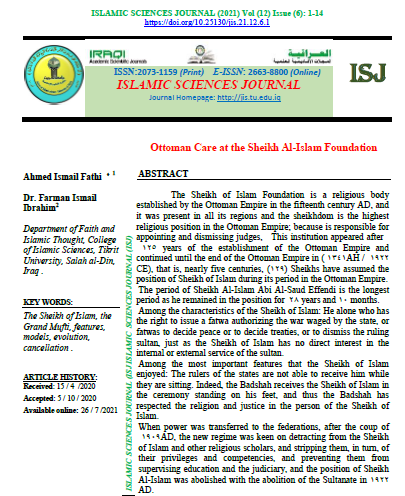Ottoman Care at the Sheikh Al-Islam Foundation
Main Article Content
Abstract
The Sheikh of Islam Foundation is a religious body established by the Ottoman Empire in the fifteenth century AD, and it was present in all its regions and the sheikhdom is the highest religious position in the Ottoman Empire; because is responsible for appointing and dismissing judges, This institution appeared after 125 years of the establishment of the Ottoman Empire and continued until the end of the Ottoman Empire in (1341 AH / 1922 CE), that is, nearly five centuries, (129) Sheikhs have assumed the position of Sheikh of Islam during its period in the Ottoman Empire.
The period of Sheikh Al-Islam Abi Al-Saud Effendi is the longest period as he remained in the position for 28 years and 10 months.
Among the characteristics of the Sheikh of Islam: He alone who has the right to issue a fatwa authorizing the war waged by the state, or fatwas to decide peace or to decide treaties, or to dismiss the ruling sultan, just as the Sheikh of Islam has no direct interest in the internal or external service of the sultan.
Among the most important features that the Sheikh of Islam enjoyed: The rulers of the states are not able to receive him while they are sitting. Indeed, the Badshah receives the Sheikh of Islam in the ceremony standing on his feet, and thus the Badshah has respected the religion and justice in the person of the Sheikh of Islam.
When power was transferred to the federations, after the coup of 1909 AD, the new regime was keen on detracting from the Sheikh of Islam and other religious scholars, and stripping them, in turn, of their privileges and competencies, and preventing them from supervising education and the judiciary, and the position of Sheikh Al-Islam was abolished with the abolition of the Sultanate in1922 AD.
Article Details

This work is licensed under a Creative Commons Attribution 4.0 International License.
COLLEGE OF ISLAMIC SCIENCES, TIKRIT UNIVERSITY. THIS IS AN OPEN ACCESS ARTICLE UNDER THE CC BY LICENSE http://creativecommons.org/licenses/by/4.0/

